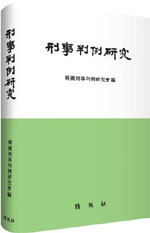학술논문
전직한 종업원의 영업비밀 사용과 업무상 배임죄
이용수 11
- 영문명
- Use of Company’s Trade Secrets by a Former Employee and Occupational Misappropriation
- 발행기관
- 한국형사판례연구회
- 저자명
- 최호진(Choi, Ho-Jin)
- 간행물 정보
- 『형사판례연구』형사판례연구 제19권, 266~297쪽, 전체 32쪽
- 주제분류
- 법학 > 법학
- 파일형태
- 발행일자
- 2011.06.30
6,640원
구매일시로부터 72시간 이내에 다운로드 가능합니다.
이 학술논문 정보는 (주)교보문고와 각 발행기관 사이에 저작물 이용 계약이 체결된 것으로, 교보문고를 통해 제공되고 있습니다.

국문 초록
영문 초록
The Supreme Court precedent is related to this litigation regarding several important issues. The first issue is on the exact definition of trade secrets acquisition and their use under the Article 18 of the Prevention of Unfair Competition Act. Other pertinent issues are, once an employee appropriates trade secrets or main assets for a rival company, in what case it would be considered as committing occupational breach of trust and what would constitute as onset of the crime. The Supreme Court held that accessing trade secrets within close time frame of the pertaining business activity with intentions to use the confidential business information regarding that activity would be sufficiently deemed as start of the crime. Additionally, in the case of electronic files such as a tub cards holder, the Supreme Court decided that running of the electronic files would be recognized as onset of the crime. These decisions by the Supreme Court are not particularly problematic. On the other hand, since it is more difficult to determine whether a retired or former employee has committed such occupational breach of trust, the issue calls for further discussion. In order to charge a former employee with professional misappropriation, the employee must be “a person who deals with affairs of others.” In such case, if the former employee has signed a contract with the employer to keep trade secret for reasonable time, there are discernable grounds for putting burden on the employee to maintain confidentiality. However, any confidentiality agreement that is either permanent or lacking specific term for time limit can be excessively infringing on the freedom of former employees to choose their occupation. As a result, provided that the former employee does not have a confidentiality agreement, he should not be punished for occupational misappropriation in order to respect constitutional freedom of career choice and to maintain a balanced interpretation. Furthermore, it is likely that the court will interpret an action requiring an employee to keep business information confidential for unreasonably long time many years after expiration of his employment contract as excessively infringing upon fundamental rights of the employee, such as the freedom of career choice. In addition, other related precedents show similar attitudes even when the employee acquires trade secrets by means of his memories. Thus, I strongly believe that the court should be more cautious in this matter in order to guard basic human rights from ambiguous interpretations.
목차
Ⅰ. 문제제기
Ⅱ. 부정경쟁방지법상의 영업비밀보호
Ⅲ. 영업비밀 침해죄와 업무상 배임죄
Ⅳ. 결론
키워드
해당간행물 수록 논문
- 진술거부권 행사와 증거이용금지 및 피의자신문권과의 관계
- 전직한 종업원의 영업비밀 사용과 업무상 배임죄
- 배임죄와 사기죄의 경합관계
- 아이템 거래 판결에 대한 고찰
- 절도죄의 객체로서 재물의 ‘재산적 가치’에 대한 검토
- 위치추적 전자장치 부착명령과 불이익변경금지
- 증언절차의 소송법 규정위반과 위증죄의 성립여부
- 형의 실효의 법률적 효과
- 불법적 · 반윤리적 목적의 승낙과 상해
- 영업범의 개념과 죄수관계
- 심신장애 판단과 감정
- 2010년도 형법판례 회고
- 협박의 의미와 대상
- 성풍속범죄에 대한 비판적 고찰
- 고소인이 간통죄의 제1심 판결 선고 후 피고소인과 다시 혼인한 경우 등과 간통고소의 효력
- 부동산 명의수탁자의 횡령죄 주체성
- 디지털 증거의 진정성립부인과 증거능력 부여 방안
- 건설산업기본법 위반죄(부정취득)와 배임수재죄의 관계
- 환자의 전원(轉院)에 있어서의 의료과실
- 권리․권한실행 의사표시의 협박죄 성립
참고문헌
관련논문
법학 > 법학분야 NEW
- 가상자산(암호화폐 등)의 법적 성질과 민사집행
- 부당한 장래적 판례변경 - 대법원 2024. 12. 19. 선고 2020다247190, 2023다302838 전원합의체 판결
- 소송법상 특별대리인
최근 이용한 논문
교보eBook 첫 방문을 환영 합니다!

신규가입 혜택 지급이 완료 되었습니다.
바로 사용 가능한 교보e캐시 1,000원 (유효기간 7일)
지금 바로 교보eBook의 다양한 콘텐츠를 이용해 보세요!



